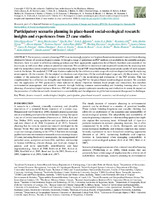Mostrar el registro sencillo del ítem
Participatory scenario planning in place-based social-ecological research: insights and experiences from 23 case studies
| dc.contributor.author | Oteros-Rozas, Elisa | |
| dc.contributor.author | Martín-López, Berta | |
| dc.contributor.author | Daw, Tim M. | |
| dc.contributor.author | Bohensky, Erin L. | |
| dc.contributor.author | Butler, James R.A. | |
| dc.contributor.author | Hill, Rosemary | |
| dc.contributor.author | Martín-Ortega, Julia | |
| dc.contributor.author | Quinlan, Allyson | |
| dc.contributor.author | Ravera, Federica | |
| dc.contributor.author | Ruiz-Mallén, Isabel | |
| dc.contributor.author | Thyresson, Matilda | |
| dc.contributor.author | Mistry, Jayalaxshmi | |
| dc.contributor.author | Palomo, Ignacio | |
| dc.contributor.author | Peterson, Garry D. | |
| dc.contributor.author | Plieninger, Tobias | |
| dc.contributor.author | Waylen, Kerry A. | |
| dc.contributor.author | Beac, Dylan M. | |
| dc.contributor.author | Bohnet, Iris C. | |
| dc.contributor.author | Hamann, Maike | |
| dc.contributor.author | Hanspach, Jan | |
| dc.contributor.author | Hubacek, Klaus | |
| dc.contributor.author | Lavorel, Sandra | |
| dc.contributor.author | Vilardy, Sandra P. | |
| dc.date.accessioned | 2017-11-21T12:02:57Z | |
| dc.date.available | 2017-11-21T12:02:57Z | |
| dc.date.issued | 2015 | |
| dc.identifier.uri | http://hdl.handle.net/10396/15482 | |
| dc.description.abstract | Participatory scenario planning (PSP) is an increasingly popular tool in place-based environmental research for evaluating alternative futures of social-ecological systems. Although a range of guidelines on PSP methods are available in the scientific and grey literature, there is a need to reflect on existing practices and their appropriate application for different objectives and contexts at the local scale, as well as on their potential perceived outcomes. We contribute to theoretical and empirical frameworks by analyzing how and why researchers assess social-ecological systems using place-based PSP, hence facilitating the appropriate uptake of such scenario tools in the future. We analyzed 23 PSP case studies conducted by the authors in a wide range of social-ecological settings by exploring seven aspects: (1) the context; (2) the original motivations and objectives; (3) the methodological approach; (4) the process; (5) the content of the scenarios; (6) the outputs of the research; and (7) the monitoring and evaluation of the PSP process. This was complemented by a reflection on strengths and weaknesses of using PSP for the place-based social-ecological research. We conclude that the application of PSP, particularly when tailored to shared objectives between local people and researchers, has enriched environmental management and scientific research through building common understanding and fostering learning about future planning of social-ecological systems. However, PSP still requires greater systematic monitoring and evaluation to assess its impact on the promotion of collective action for transitions to sustainability and the adaptation to global environmental change and its challenges. | es_ES |
| dc.format.mimetype | application/pdf | es_ES |
| dc.language.iso | eng | es_ES |
| dc.publisher | Resilience Alliance Publications | es_ES |
| dc.rights | https://creativecommons.org/licenses/by-nc-nd/4.0/ | es_ES |
| dc.source | Ecology and Society 20(4), 32 (2015) | es_ES |
| dc.subject | Futures research | es_ES |
| dc.subject | Methodological insights | es_ES |
| dc.subject | Participation | es_ES |
| dc.subject | Place-based research | es_ES |
| dc.subject | Scenarios | es_ES |
| dc.subject | Social-ecological systems | es_ES |
| dc.title | Participatory scenario planning in place-based social-ecological research: insights and experiences from 23 case studies | es_ES |
| dc.type | info:eu-repo/semantics/article | es_ES |
| dc.relation.publisherversion | http://dx.doi.org/10.5751/ES-07985-200432 | es_ES |
| dc.relation.projectID | info:eu-repo/grantAgreement/EC/FP7/2007-2013/282845 | es_ES |
| dc.rights.accessRights | info:eu-repo/semantics/openAccess | es_ES |

